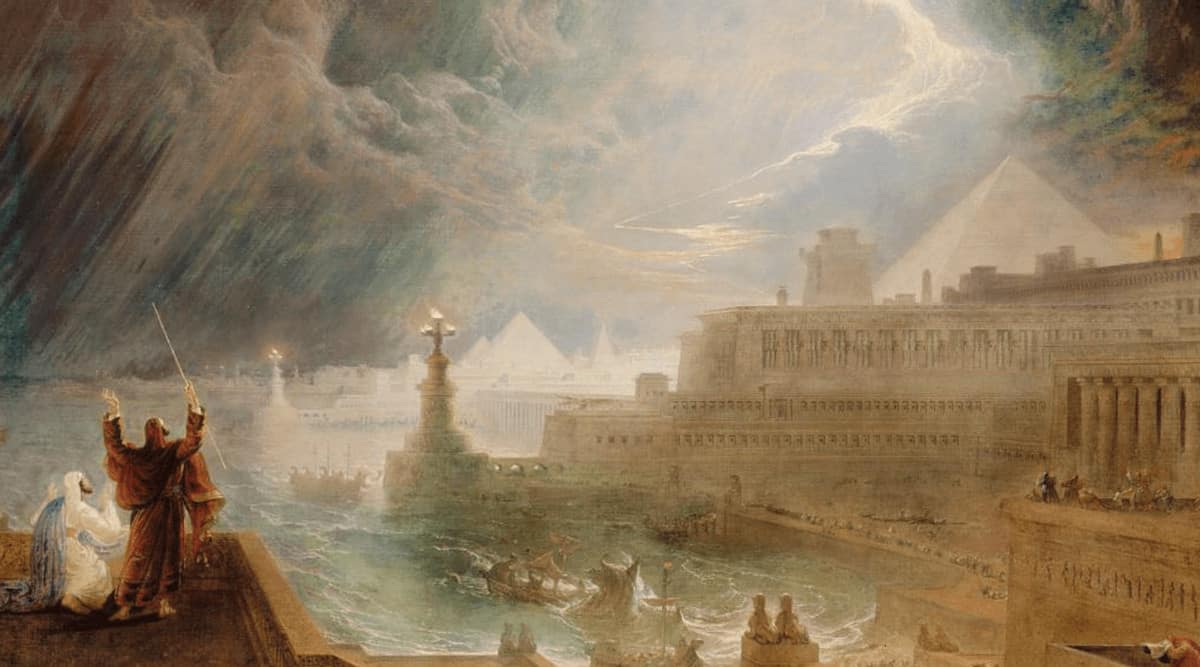Many Bible readers are familiar with the plague in Egypt at the time of the Exodus (Exod 7:14–12:32)—water turning to blood and infestations of frogs, lice, flies, locusts, and the like. With coronavirus on everyone’s mind, questions abound of whether the word “pandemic” appears in the Bible, too.
The short answer is no—“pandemic” is not in the Bible. However, the words “plague” and “pestilence” are (no less than 122 times) and often reference individuals or nations1afflicted with a terrible illness.2
One Hebrew word often used is maggephah, which can mean slaughter (of battle), plague, pestilence (divine judgment), or a fatal blow, though there are other related words:
- neḡaʿ (Heb.) → plague, disease, stroke (metaphorical of disease)
- makkah (Heb.) → blow, wound, slaughter, plague, pestilence
- deber (Heb.) → pestilence, plague, murrain, cattle disease/plague
- mastix (Gr.) → a whip, scourge, plague (a calamity, misfortune)
- plēgē (Gr.) → a blow, stripe, wound, affliction, plague
- loimos (Gr.) → pestilence, pest, plague
Many of these references point to God’s use of diseases (or a threat of diseases—see Exod 9:15; Lev 26:25; Deut 28:20–24; Num 14:12; Zech 14:18) to accomplish his divine and sovereign purposes, warn people and nations of coming judgment for unrepentant sin, or rattle a person or nation enough to wake them from spiritual laziness.
We don’t know why we’re experiencing a pandemic today—but you can further explore the context of the below examples, paying attention to the events leading up to and following the plagues.
Genesis 12
In Genesis 12:10–20, a famine in the land propels Abram to sojourn to Egypt. Doubting God and to spare his life, Abram selfishly coerces his beautiful wife, Sarai, to pretend to be his sister. Egypt’s Pharaoh subsequently takes Sarai into his palace and deals well with Abram by giving him sheep, oxen, and servants. But God responds harshly.
The Lord afflicted Pharaoh and his house with great plagues (neḡaʿ)3 because of Sarai, Abram’s wife. (Gen 12:17)
Numbers 11
God had provided manna to sustain the Israelites while they were wandering in the wilderness, but they longed for the good and tasty food they had in Egypt. So God promises to provide meat (v. 8), but it would not be a blessing—there would be so much that the people would become sick of it. God follows through and provides abundant quail, but before the Israelites finish eating, they fall ill.
While the meat was yet between their teeth, before it was consumed, the anger of the Lord was kindled against the people, and the Lord struck down the people with a very great plague (makkah). (Num 11:33)
Numbers 14
In Numbers 13, Moses sends 12 spies to scout out the promised land, and 10 of the 12 return with a negative report: “We are not able to go up against the people, for they are stronger than we are” (v. 31). The people rebel against Moses and Aaron, but they are really rebelling against God—and God judges them sternly for it.
The men whom Moses sent to spy out the land, who returned and made all the congregation grumble against him by bringing up a bad report about the land—the men who brought up a bad report of the land—died by plague (maggephah) before the Lord. Of those men who went to spy out the land, only Joshua the son of Nun and Caleb the son of Jephunneh remained alive. (Num 14:36–38)
Numbers 16
Korah—a discontent levitical priest with many followers—accuses Moses of prideful leadership and tries to overthrow him. Moses seeks out God’s direction, then challenges Korah to come before the Lord and allow God to choose his rightful leaders. Korah and his followers refuse, the ground splits apart and consumes “all the people who had belonged to Korah and their goods,” (v. 32), the rest of the congregation of Israel grumbles, and a terrible plague ensues (v. 47). Aaron steps in to make atonement for the people and thus stops the disease—but not before 14,700 people die.
And [Aaron] stood between the dead and the living, and the plague (maggephah) was stopped. Now those who died in the plague were 14,700, besides those who died in the affair of Korah. (Num 16:48–49)
Numbers 25
God’s people are unfaithful with Moabite women and worship their gods, arousing the Lord’s anger, which shows itself in a plague that began to strike down thousands among Israel. Phinehas takes a stand for righteousness by killing one couple. God commends him for his zeal by stopping the plague—which had already killed 24,000.
When Phinehas the son of Eleazar, son of Aaron the priest, saw it, he rose and left the congregation and took a spear in his hand and went after the man of Israel into the chamber and pierced both of them, the man of Israel and the woman through her belly. Thus the plague (maggephah) on the people of Israel was stopped. Nevertheless, those who died by the plague (maggephah) were twenty-four thousand. (Num 25:7–9; see also Psa 106:30)
Psalms 38–41
Psalms 38–41 are linked by a primary theme of confession of sin amid serious trouble, and in three of these four psalms, those “troubles” involve serious illness. In Psalm 38, for example, David describes his festering sores (v. 5) and sides that are “filled with burning” (v. 7). He then laments over his loneliness, a result of his affliction.
O Lord, all my longing is before you; my sighing is not hidden from you. My heart throbs; my strength fails me, and the light of my eyes—it also has gone from me. My friends and companions stand aloof from my plague (neḡaʿ), and my nearest kin stand far off. (Psa 38:9–11)
2 Samuel 24
David is compelled to take a census of the people of Israel and Judah, but this goes against a principle God established in Exodus 30:12: that a man only has the right to count or number what belongs to him. Israel belonged to God—not David—and it was up to God to direct a counting.4 David’s own heart condemned him afterward, and interestingly, God allows David to choose his judgment: three years of famine, three months before his enemies, or three days of plague. David chooses three days of plague, which hits Israel severely.
So the Lord sent a pestilence (deber) on Israel from the morning until the appointed time. And there died of the people from Dan to Beersheba 70,000 men. (2 Sam 24:15)
Luke 17
John the Baptist sends some of his disciples to find out if Jesus is indeed the Messiah, or whether they should look for another, and Jesus’ actions that follow provide the answer.
In that hour [Jesus] healed many people of diseases and plagues (mastix) and evil spirits, and on many who were blind he bestowed sight. And he answered them, “Go and tell John what you have seen and heard: the blind receive their sight, the lame walk, lepers are cleansed, and the deaf hear, the dead are raised up, the poor have good news preached to them. And blessed is the one who is not offended by me.” (Luke 7:21–23; cf. Isa 35:5–6; 42:7)
Matthew 24
Just after Jesus condemns the teachers of the law for their hypocritical hearts and prophesies about the destruction of Jerusalem, his disciples ask him what signs will appear at the time of his return and at the end of the age (Matt 23, 24:3).
Jesus answered and said to them: “Take heed that no one deceives you. For many will come in My name, saying, ‘I am the Christ,’ and will deceive many. And you will hear of wars and rumors of wars. See that you are not troubled; for all these things must come to pass, but the end is not yet. For nation will rise against nation, and kingdom against kingdom. And there will be famines, pestilences (loimos) and earthquakes in various places. All these are the beginning of sorrows.” (Matt 24:4–8 NKJV)
Revelation 8–16
In Revelation 8:13, the apostle John describes “three woes,” and each is a state of intense grief, anguish, or distress to compel humanity to repent. The first woe (Rev 9:30) involves a plague (something like locusts that sting), and the second involves a third of mankind being killed (Rev 9:15–16).
The rest of mankind, who were not killed by these plagues (plēgē) did not repent of the works of their hands nor give up worshiping demons and idols of gold and silver and bronze and stone and wood, which cannot see or hear or walk. (Rev 9:20)
The third woe involves the last seven plagues, or “bowls”—apocalyptic events poured out on the wicked (Rev 16).
And great hailstones, about one hundred pounds each, fell from heaven on people; and they cursed God for the plague of the hail, because the plague (plēgē) was so severe. (Rev 16:21)
***
Dig deeper into the topic of plagues in the Bible with the Bible Word Study Guide, available in Logos 8 Starter and above.
Header image: Seventh Plague of Egypt by John Martin (1789–1854). Source: commons.wikimedia.org
-
The words “pestilence” and “plague” in the Bible often refer to horrible diseases, but not in all instances. It can also refer to destruction or an environmental disaster as an expression of divine judgment, usually resulting in death. The purpose may be as punishment or to encourage repentance. Martin Maner, Dictionary of Bible Themes, “Plague,” 4843 (2009).
-
The English words “pestilence” and “plague” are defined as widespread infectious diseases with a high death rate https://www.merriam-webster.com/thesaurus/plague and https://www.merriam-webster.com/thesaurus/pestilence.
- Interestingly, the word for “plagues” here (neḡaʿ) is the same word used of the 10 plagues God sent on Pharaoh and Egypt (Exod 11:1).
- Guzik, David. David Guzik’s Commentary on the Bible: 2 Samuel, “2 Samuel 24: David and the Census,” (Santa Barbara), 2013.








